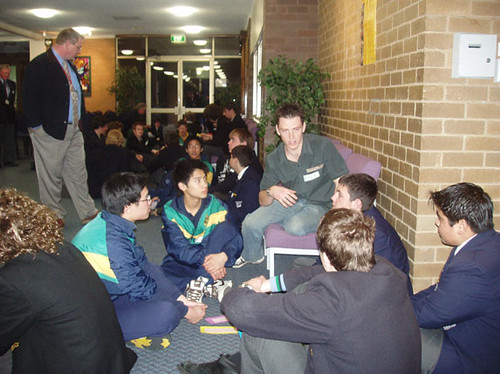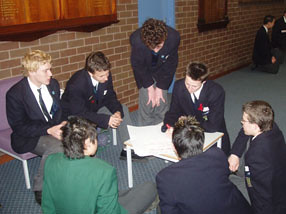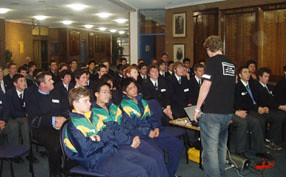28 September 2005
TERRORISM, EPIDEMICS OR GLOBAL WARMING - WHAT ARE THE MOST SERIOUS THREATS WE FACE?
Leaving aside the concerns that have been expressed about the legislation by groups such as the Law Council of Australia and concerns about granting further powers to a government that appears to exhibit little regard for human rights (eg Cornelia Rau, David Hicks, Victoria Solon and now Scott Parkin the peace activist recently deported for allegedly being a non specified 'threat to national security') it is a concern that the fears of the community about what is really an unlikely threat are being exploited whilst what are potentially far more serious threats do not seem to receive the same priority.
See the next post for updated information about the threat posed by global warming for one example.
Another potentially deady threat is that posed by the avian influenza virus. Public health experts fear the bird flu virus, which has now spread to ten countries in S E Asia and resulted in over 50 confirmed deaths, is mutating and could develop the ability to spread easily between humans, with the potential to kill millions in a pandemic.
Recognizing that the Indonesian government does not have the resources to deal effectively with the potential epidemic, the Australian government has announced the provision of an additional 40,000 flu vaccines to combat the outbreak of the disease in an attempt to address the problem at its source.
Nevertheless it can be questioned if it is enough, and again indirectly raises the question of Aid levels and the developed world's support for the Millennium Development Goals. Providing resources to address issues of poverty, disease and alternative sources of energy as well as reducing expenditure on armaments would seem to be a more effective means of investing in security. Unfortunately that message still does not seem to have got through to many world leaders.
A scorecard on the various issues addressed at the recent UN summit can be viewed in the latest edition of Ozspirit
"CLIMATE CHANGE THE MOST SERIOUS ISSUE FACING HUMANKIND" SAYS SCIENTIST AND AUTHOR
"Destructive hurricanes such as those that have pounded the Gulf of Mexico recently could become more frequent" he predicted. "As the planet warms, of course a lot of heat transfer is going into the ocean, so we have the potential to generate massive storms like this."
"Many people fear that we're seeing a permanent shift to a much more active atmosphere where these sort of storms will be now a permanent feature of life."
"I don't think it's an exaggeration to suggest that these big changes in the atmosphere can threaten civilisation as we know it."
The warning is the latest of similar warnings expressed by members of the scientific community just as the extreme weather conditions experienced in southern USA is the most recent of the signs that the world is heading towards an ecological disaster.
Meteorologists expressed amazement recently at the first ever hurricane recorded in the South Atlantic off Brazil where it has always been assumed the water was too cold for such an event to occur see the Hadley Centre for Climate Prediction and Research website.
When this is considered along with the fact that parts of Australia continue to experience the worst drought on record, the rate of melting of the polar ice caps has recently been found to be far greater than previously realized, and that in 2003 Europe experienced its worst heat wave on record resulting in an extra 40,000 deaths, it seems difficult to deny as some governments continue to do, that global warming due to human activity is a major problem requiring urgent action at the global level.
Australian Conservation Foundation president Professor Ian Lowe has also warned, in a new book called "A Big Fix", that civilisation faces ecological destruction.
"The warnings from scientists are urgent and unequivocal: our civilisation is unwittingly stepping in front of an ecological lorry that is about to flatten us," he said in a statement.
"We are using resources future generations will need, damaging environmental systems and compromising social stability by increasing the gap between rich and poor."
"In short, we are consuming the future. Without a radical re-thinking of the way we currently live, our society is doomed."
G8 DEBT CANCELLATION ENDORSED BY WORLD BANK AND IMF
This means US$40 billion of debt will be cancelled for 18 of the world's poorest countries. The decision was welcomed by those who have long campaigned for debt relief such as Jubilee Australia
Nevertheless, the deal represents just a beginning for the 'drop the debt' campaign. There is still a further 24 highly indebted poor countries desperately in need of similar relief who have so far not qualified under the strict conditions imposed by the Heavily Indebted Poor Countries (HIPC) process.
Jubilee Australia argues that the HIPC process should be abandoned, all HIPC nations should be allowed to qualify for debt forgiveness and the world economic community should be considering the crippling debt of other highly indebted developing countries, such as Indonesia.
URGENT APPEAL FROM FAIRWEAR
In a recent meeting with the Federal Minister for Workplace Relations Kevin Andrews, it was revealed to Fair Wear that the Federal Government plans to remove or override all existing outworker protections as part of their Industrial Relations "reforms".
Fairwear is mounting a campaign to persuade the government to modify its proposals. Full details of how you can help, including the text of an email that can be sent to the Minister for Workplace Relations, are available at the Fairwear website.
Daisy Gardener from Fairwear will address the next 'Justice in the Pub' night to be held at 'Bridie O’Reilly's' cnr Sydney and Brunswick Rds, Brunswick on Tue 11th Oct, 7.30pm for 8.00pm (note change of date)
15 September 2005
DIRECTOR OF EDMUND RICE CENTRE LAUNCHES BISHOP'S SOCIAL JUSTICE SUNDAY STATEMENT
Among many issues, the Statement highlights the amount of wealth that is wasted in a world where poverty affects billions. Each year Australians spend more than $10 billion on products and services that are not used, including $5 billion on food that is ultimately thrown out. (This can be compared to the projected $4 billion that is to be spent on overseas aid by 2010 -see next post)
At the same time the pursuit of wealth and economic demands can leave people with less time for family and friends, health and spiritual fulfilment.
The statement reminds us that we cannot turn from the great issues facing our world, from environmental degradation to poverty to refugees to war. For many people in our world the light we offer may be their only hope.
The full text of the Bishop's statement is available at the website of the Australian Catholic Social Justice Council
AID AND THE MILLENIUM PLUS FIVE SUMMIT
Whilst the move has been welcomed as a positive step it still does not go far enough. According to AID/WATCH a not for profit, activist organization monitoring and campaigning on Australian overseas aid and trade policies and programs, the announcement by Prime Minister is not as generous as expected, and still falls well below the 0.7% of Gross National Income (GNI) amount required to meet the Millenium Development Goals.
Given the predicted rate of growth of the Australian economy in that time, the new level of aid approximates to 0.37% of GNI. Whilst this represents a welcome and significant increase from the present 0.28% it still falls far short of what is required and leaves Australia in 18th place out of the 22 most wealthy countries on the aid donor table.
The purpose of the Millenium Plus Five Summit was to evaluate progress towards the implementation of the Millenium Development Goals. The most recent UN progress report on that progress can be viewed here
Following weeks of intense negotiations and numerous draft texts, the UN General Assembly approved a final outcome document for the Millennium+5 Summit. Heads of State who gathered at UN headquarters for the summit approved the text. However reaction to the final agreed document was mixed - a few were pleased with the text, while many others felt that priority issues had become diluted to the point of meaninglessness.
The statement issued by the summit and other background information about the Millenium Plus Five Summit can be viewed at the Global Policy Forum Website
CONCERNS AT PROPOSED WORKPLACE CHANGES
The paper draws upon the long tradition of Catholic Social Teaching in emphasizing the fundamental principle of the dignity of the human person in any discussion of work and employment. This means that employees cannot be treated as commodities nor their labour regarded in purely economic terms. All employees have the right to just minimum wages and safe working conditions and every family the right to sufficient income through work
The discussion paper goes on to express concern at some key elements of the Government's proposals which it says could allow some employers to mistreat employees, lead to lower wages and impose unfair burdens on low-paid workers.
It also argues that the Government's changes to wage-fixing, which will see minimum wages fixed on the basis of the needs of a single adult worker rather than a 'living wage' needed to support dependants, could have a serious effect on families.
The commission's paper also rejects the Government's argument that the removal of unfair dismissal laws for small to medium businesses would generate jobs, and says that removing accountability for those with powers to hire and fire "is to put at risk the legal incentive for some firms to undertake fair and just treatment of their employees".
The full text of the briefing paper is available at the ACCER website.
DOES CATHOLIC SOCIAL TEACHING ENDORSE CAPITALISM?
The research findings were challenged by columnist Christopher Pearson who in turn was reflecting opinions expressed by the Centre for Independent Studies (an Australian 'think tank' which argues in favour of a free enterprise economy and minimal government intervention in the lives of individuals)
In arguing his case, Pearson accused the 'Vinnies' of being anti-free market and thereby in contravention of Catholic Social Teaching. He claimed that the late pope John Paul II endorsed capitalism when after asking the question as to whether Capitalism was the only way forward following the collapse of communism, he wrote in his encyclical 'Centesimus Annus' published in 1971:- "If by capitalism is meant an economic system which recognises the fundamental and positive role of business, the market, private property and the resulting responsibility for the means of production as well as free human creativity in the economic sector, then the answer is certainly in the affirmative. "
However as Fr Joe Caddy of Centacare, Victoria pointed out when commenting on the controversy, the pope went on to say (in a passage that was not quoted by Pearson)"But if by capitalism is meant a system in which freedom in the economic sector is not circumscribed within a strong juridical framework which places it at the service of human freedom in its totality and which sees it as a particular aspect of that freedom, the core of which is ethical and religious, then the reply is certainly negative."
John Paul II also went on to warn of the danger of 'a radical capitalistic ideology' and 'the free development of market forces'.
As Fr Caddy points out "Clearly the full teaching of John Paul is a long way from the unequivocal embracing of capitalism in Catholic Social Teaching. …. In fact the Church’s position on economic systems is pragmatic. Economic systems are always to be at the service of human dignity, community and the common good. It is for that reason that in determining access to essential human goods and services, such as food, water, education, shelter, security and warmth, and access to a level of opportunity commensurate to the society in which we live, such as affordable banking, credit and communications, the market cannot be the sole arbiter."
1 September 2005
SEPTEMBER 10th - ANOTHER WHITE WRISTBAND DAY
Supporters of the campaign are preparing to again don their white wristbands to remind world leaders assembling for the UN Summit in New York early next month, that the world is still watching and waiting for them to make poverty history. In Australia, one encouraging sign that the message is being heard is that the Prime Minister has acknowledged the importance of the issue by his recent decision to attend the summit.
In Victoria, the Make Poverty History campaign has received new momentum with all schools, parishes, deaneries and associated groups in the Archdiocese of Melbourne being asked to support the campaign. A letter from Archbishop Denis Hart points to the rich tradition of social teaching within the church and reminds Christians of their call to work with others for transformation of the world. In the words of the Archbishop "The Make Poverty History Campaign enables us to make others aware of those who suffer and the hope that the Good News brings to those who hunger for justice."
Students from all Edmund Rice Schools in Victoria have already heeded that call. At the recent seminar day at Parade College in Bundoora, they resolved to promote the campaign in their school communities in a range of ways such as school newsletters, assemblies, the distribution of fact sheets and bumper stickers, encouraging their teachers to raise the issue in classes, the organization of competitions, billboards and other events some of which could be promoted in the local media and by selling the wristbands to be worn on the remaining white wristband days in their school communities.
This year provides an unprecedented opportunity for all of us to make a decisive step towards eliminating a major source of evil and suffering in our world. It is to be hoped we can all contribute to raising awareness about this issue and wear a white wristband on Sep 10th and again on Dec 10th. Wristbands are available from any Oxfam shop or through Caritas.
AUSTRALIA AND NEW ZEALAND FAIL IN AID COMMITMENT
Mr de Groot, who heads the coalition of more than 70 aid and community organisations, said Australia played a significant role in the South East Asia region in almost every area except in funding the fight against poverty where it now lags badly behind other nations.
"Australia now stands as the 'odd man out' in failing to deliver a blueprint for substantially increasing overseas aid to 0.5% by 2010, in line with reaching the UN target of 0.7% by 2015," Mr de Groot said.
"It is bitterly disappointing that after showing great leadership in responding to the victims of the tsunami, the Australian government has failed to follow the lead of other developed countries and commit extra funding in line with the Millennium Development Goals."
Mr de Groot said next month world leaders would meet in New York to assess the progress of the fight against poverty providing an opportunity for the government to act. Australia is in danger of becoming an international embarrassment on aid and remains the only major developed country not to significantly commit aid to meet the United Nation’s blueprint for halving world poverty.
The Australian government is lagging 16 out of 22 OECD donor countries in terms of its level of overseas aid. And our ranking is expected to plunge further to 19 out of 22 when new pledges from other nations are considered.
For a detailed analysis of Australia’s record on aid visit the Australian Council for International Development (ACFID) website .
DEBUNKING THE MYTHS ABOUT CLIMATE CHANGE
The myths addressed are that:-
• Only 'greenies' are worried about climate change
• Climate change is natural
• Climate change will not affect us in our lifetime
• Australia will not be affected
• The developing world is responsible for climate change
• The Australian Government is already doing enough
• The global economy will suffer if we reduce carbon dioxide emissions
• Reducing emissions will harm Australian industry and Australian jobs
• There is nothing I can do to stop climate change
The complete analysis is available for viewing at the above website.
The website also has details of the Centre's Earth Charter project. The Earth Charter is a declaration of fundamental principles for a just, sustainable and peaceful global society in the 21st century. It recognises that everything is interlinked, including the environment, justice, the economy, ways of living together, spiritual ideas, and is underpinned by four overarching themes:-
• Respect and Care for the Community of Life
• Ecological Integrity
• Social and Economic Justice
• Democracy, Non-violence and Peace
The Charter enables people to broaden their perspectives on local and global problems, develop new visions of what is possible and then devise integrated, long term solutions for the future.


